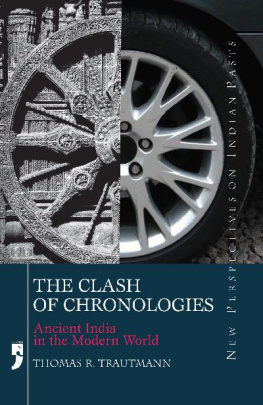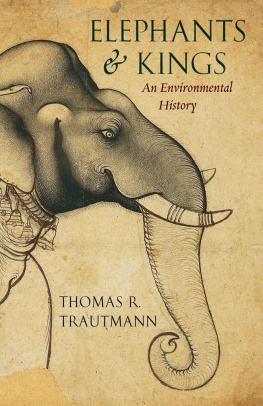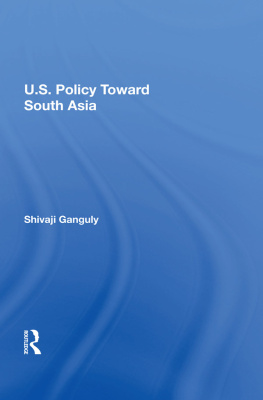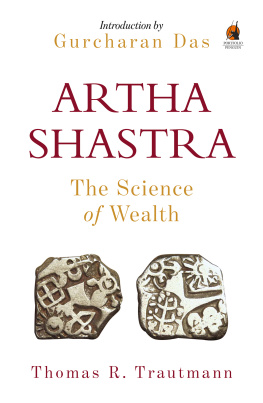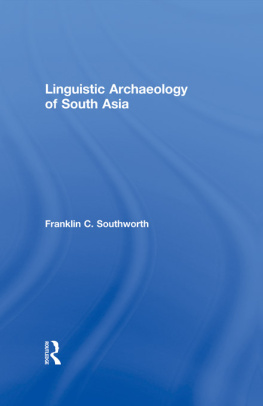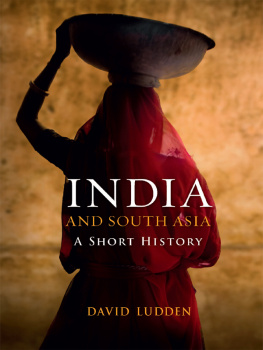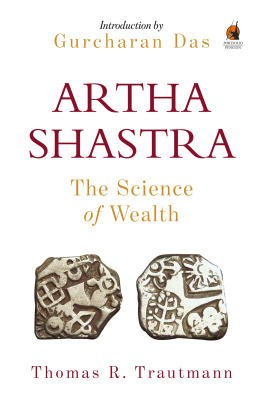Thomas R. Trautmann - Kinship and History in South Asia: Four Lectures
Here you can read online Thomas R. Trautmann - Kinship and History in South Asia: Four Lectures full text of the book (entire story) in english for free. Download pdf and epub, get meaning, cover and reviews about this ebook. year: 2020, publisher: University of Michigan Center for South and Southeast Asian Studies, genre: Children. Description of the work, (preface) as well as reviews are available. Best literature library LitArk.com created for fans of good reading and offers a wide selection of genres:
Romance novel
Science fiction
Adventure
Detective
Science
History
Home and family
Prose
Art
Politics
Computer
Non-fiction
Religion
Business
Children
Humor
Choose a favorite category and find really read worthwhile books. Enjoy immersion in the world of imagination, feel the emotions of the characters or learn something new for yourself, make an fascinating discovery.

- Book:Kinship and History in South Asia: Four Lectures
- Author:
- Publisher:University of Michigan Center for South and Southeast Asian Studies
- Genre:
- Year:2020
- Rating:5 / 5
- Favourites:Add to favourites
- Your mark:
- 100
- 1
- 2
- 3
- 4
- 5
Kinship and History in South Asia: Four Lectures: summary, description and annotation
We offer to read an annotation, description, summary or preface (depends on what the author of the book "Kinship and History in South Asia: Four Lectures" wrote himself). If you haven't found the necessary information about the book — write in the comments, we will try to find it.
Kinship and History in South Asia: Four Lectures — read online for free the complete book (whole text) full work
Below is the text of the book, divided by pages. System saving the place of the last page read, allows you to conveniently read the book "Kinship and History in South Asia: Four Lectures" online for free, without having to search again every time where you left off. Put a bookmark, and you can go to the page where you finished reading at any time.
Font size:
Interval:
Bookmark:

THE UNIVERSITY OF MICHIGAN
CENTER FOR SOUTH AND SOUTHEAST ASIAN STUDIES
MICHIGAN PAPERS ON SOUTH AND SOUTHEAST ASIA
Editorial Board
Alton L. Becker
John K. Musgrave
George B. Simmons
Thomas R. Trautmann, chm.
Ann Arbor, Michigan
KINSHIP AND HISTORY IN SOUTH ASIA
Edited by
Thomas R. Trautmann
Ann Arbor
Center for South and Southeast Asian Studies
The University of Michigan
1974
Michigan Papers on South and Southeast Asia, 7
Open access edition funded by the National Endowment for the Humanities / Andrew W. Mellon Foundation Humanities Open Book Program
Library of Congress Catalog Card Number 74-76057
International Standard Book No. 0-88386-417-7
Copyright 1974
by
Center for South and Southeast Asian Studies
The University of Michigan
Printed in the United States of America
ISBN 978-0-88386-417-3 (paper)
ISBN 978-0-472-12817-4 (ebook)
ISBN 978-0-472-90217-0 (open access)
The text of this book is licensed under a Creative Commons Attribution-NonCommercial-NoDerivatives 4.0 International License: https://creativecommons.org/licenses/by-nc-nd/4.0/
CONTENTS
Brenda E.F. Beck
George L. Hart, III
Thomas R. Trautmann
Narendra K. Wagle
The study of South Asian kinship has largely remained the special preserve of anthropologists and sociologists. While the historical dimension of kinship in the Subcontinent has not been ignored, few historians and students of Indian literatures have played a part in its elucidation. N.K. Wagle and myself, historians of India with an interest in kinship, believing that Indianists of various disciplines have much to say to one another on the subject of "Kinship and History in South Asia," and hopefully much to learn as well, organized a small conference under that title at the University of Toronto on May 12, 1973. The conference did not address itself to the difficult theoretical issues posed by the conjunction of sociological and historical knowledge; rather, scholars known to be engaged in kinship studies were invited to present and discuss papers on their current research, in hopes of broadening the base of kinship studies by bringing together the specialized works of scholars from different disciplines.
Four of the conference papers are published here. Scholarship is a community venture, but it proceeds through individuals, and although these papers draw upon one another, and show several common concerns (in particular the theoretical importance of Dravidian systems), they remain specialist studies each with its own raison d'etre . Brenda E. F. Beck contributes a study of the "kinship nucleus" in Tamil folklore, Lvi-Straussian both in its treatment of kinship and of mythology; George L. Hart's study of woman and the sacred in the ancient Tamil literature of the Sangam attempts to elucidate the data of this literature in its own terms, and also to relate it to Beck's "kinship nucleus"; Trautmann's is a critical examination of the evidence for cross-cousin marriage in early North India, essentially a question of determining historical fact from literary materials; and Wagle presents a survey of the data on kinship categories to be found in the Pali Jtakas.
Two of the papers which were read at the Toronto conference do not appear in this volume. Ronald Inden and Ralph Nicholas' eighty-page paper on Bengali kinship is still growing and will, I am told, be published in monograph form when it reaches maturity. Clifford R. Jones' excellent paper on inscriptional evidence for the antiquity of the Ckyr community of Kerala will appear in a volume devoted to Sanskrit drama to be published in Hawaii. All of the papers published here have been revised since the conference; thus the Tamil folktales recounted in Beck's original paper, to which Hart and Trautmann refer, have been compressed in the published version, and will be presented more fully in a later work.
It is my pleasant duty to acknowledge the support extended by the South Asia Regional Council, the University of Toronto through its South Asian Studies Committee of the International Studies Programme, and the Center for South and Southeast Asian Studies of the University of Michigan, which made the holding of the conference and the publication of this volume possible. We are grateful to the Department of Sanskrit and Indian Studies, University of Toronto, for its hospitality during the conference.
T.R.T.
BRENDA E.F. BECK has a B. A. degree from the University of Chicago, and B. Litt. and D. Phil, degrees from Oxford University. She has lectured at the Ecole Pratique des Hautes tudes in Paris, and taught at the University of Chicago. She is now an Associate Professor of Anthropology at the University of British Columbia. Dr. Beck is the author of Peasant Society in Koku: A Study of Right and Left Subcastes in South India , as well as several articles. She is currently concentrating her research on folklore, mythology and ceremony.
GEORGE L. HART, III took a Ph.D. in Sanskrit from Harvard University. His dissertation is to be published by California University press under the title, The Poems of Ancient Tamil : Their Milieu and Their Sanskrit Counterparts . Dr. Hart is currently Assistant Professor in the Department of South Asian Studies, the University of Wisconsin, where he teaches Tamil and Sanskrit language and literature.
THOMAS R. TRAUTMANN holds a B. A. in Anthropology from Beloit College and a Ph.D. in History from the University of London. He has been Lecturer in the Early History of South Asia in the School of Oriental and African Studies, London, and is now Associate Professor of History at the University of Michigan, where he teaches the history of ancient India. Dr. Trautmann's book, Kau t ilya and the Arthastra: A Statistical Investigation of the Authorship and Evolution is not representative of his current research interests; the title of the present volume is.
NARENDRA K. WAGLE also studied at the School of Oriental and African Studies, University of London, from which he got a Ph.D. in History, followed by post-doctoral study at the University of Chicago. He now holds the post of Associate Professor in the Department of Sanskrit and Indian Studies, University of Toronto. His major publication is a book, Society at the Time of the Buddha.
by
BRENDA E.F. BECK
This paper builds on the idea that there are two dimensions or levels to any kinship structure. One level describes relations between descent groups, the other certain special bonds that exist between the members of a small "kin nucleus. The discussion will pursue this idea as it relates to Dravidian kinship in general, and to the Tamil-speaking groups of South India, in particular.
The Idea of Opposing Forces Within the Kin Nucleus
A.R. Radcliffe-Brown was the first to suggest the idea of a kin nucleus defined by certain complementary forces or sentiments. He noticed that ties of sentiment and of familiarity seemed to counterbalance relationships of descent and authority in many societies. He particularly singled out egos father and egos mothers brother as men whose attitudes were patterned so as to make an opposing pair. Where the fathers role was authoritarian, he observed, the mothers brothers was equalitarian. He also observed that familial authority tended to follow lines of descent and inheritance, so that in a matrilineal society the mothers brother could be expected to occupy a position of command and the father to take on the role of friend and sympathizer. Radcliffe-Brown also noticed that the focal members of this counterbalancing structure were males who belonged to two different descent groups.
Font size:
Interval:
Bookmark:
Similar books «Kinship and History in South Asia: Four Lectures»
Look at similar books to Kinship and History in South Asia: Four Lectures. We have selected literature similar in name and meaning in the hope of providing readers with more options to find new, interesting, not yet read works.
Discussion, reviews of the book Kinship and History in South Asia: Four Lectures and just readers' own opinions. Leave your comments, write what you think about the work, its meaning or the main characters. Specify what exactly you liked and what you didn't like, and why you think so.

